
ai-engineering-hub
In-depth tutorials on LLMs, RAGs and real-world AI agent applications.
Stars: 18138
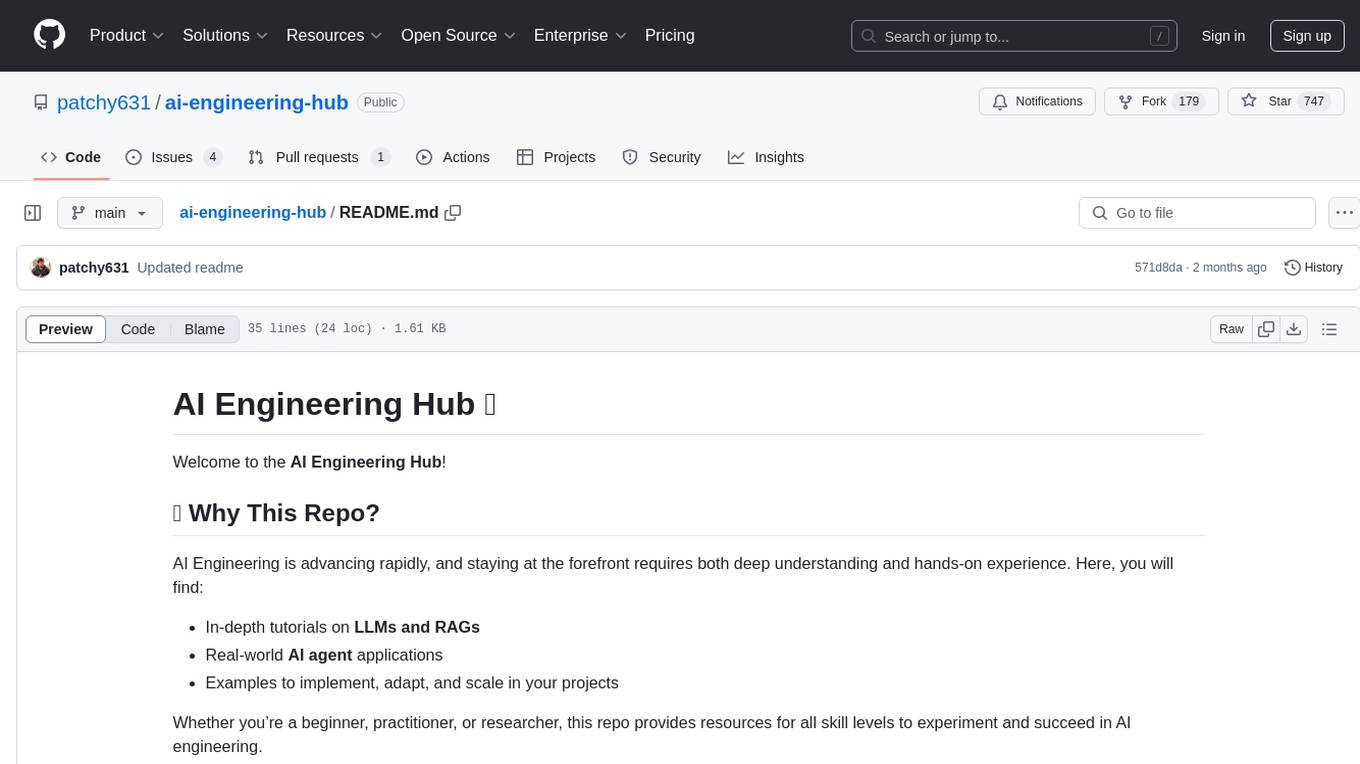
The AI Engineering Hub is a repository that provides in-depth tutorials on LLMs and RAGs, real-world AI agent applications, and examples to implement, adapt, and scale in projects. It caters to beginners, practitioners, and researchers, offering resources for all skill levels to experiment and succeed in AI engineering.
README:
Welcome to the AI Engineering Hub!
AI Engineering is advancing rapidly, and staying at the forefront requires both deep understanding and hands-on experience. Here, you will find:
- In-depth tutorials on LLMs and RAGs
- Real-world AI agent applications
- Examples to implement, adapt, and scale in your projects
Whether you’re a beginner, practitioner, or researcher, this repo provides resources for all skill levels to experiment and succeed in AI engineering.
Get a FREE Data Science eBook 📖 with 150+ essential lessons in Data Science when you subscribe to our newsletter! Stay in the loop with the latest tutorials, insights, and exclusive resources. Subscribe now!
We welcome contributors! Whether you want to add new tutorials, improve existing code, or report issues, your contributions make this community thrive. Here’s how to get involved:
- Fork the repository.
- Create a new branch for your contribution.
- Submit a Pull Request and describe the improvements.
This repository is licensed under the MIT License - see the LICENSE file for details.
For discussions, suggestions, and more, feel free to create an issue or reach out directly!
Happy Coding! 🎉
For Tasks:
Click tags to check more tools for each tasksFor Jobs:
Alternative AI tools for ai-engineering-hub
Similar Open Source Tools

ai-engineering-hub
The AI Engineering Hub is a repository that provides in-depth tutorials on LLMs and RAGs, real-world AI agent applications, and examples to implement, adapt, and scale in projects. It caters to beginners, practitioners, and researchers, offering resources for all skill levels to experiment and succeed in AI engineering.
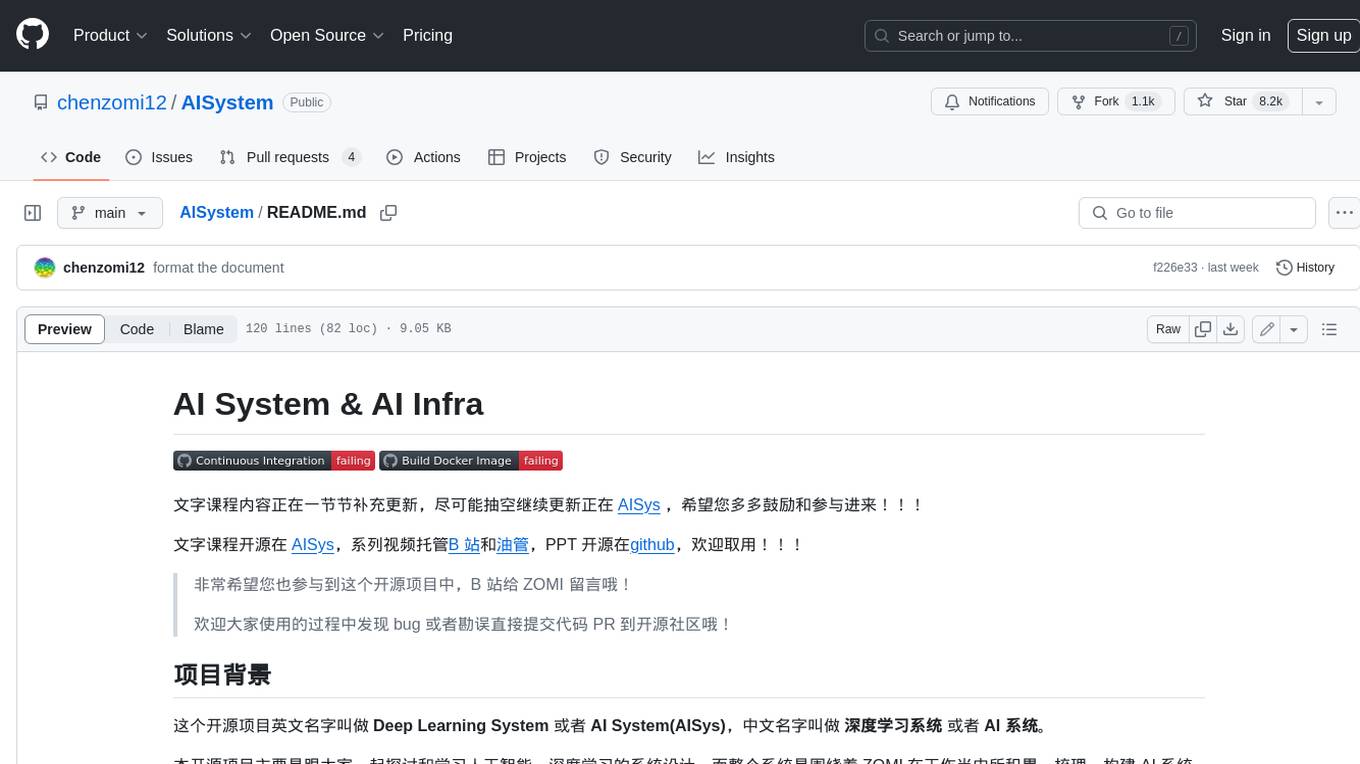
AISystem
This open-source project, also known as **Deep Learning System** or **AI System (AISys)**, aims to explore and learn about the system design of artificial intelligence and deep learning. The project is centered around the full-stack content of AI systems that ZOMI has accumulated,整理, and built during his work. The goal is to collaborate with all friends who are interested in AI open-source projects to jointly promote learning and discussion.
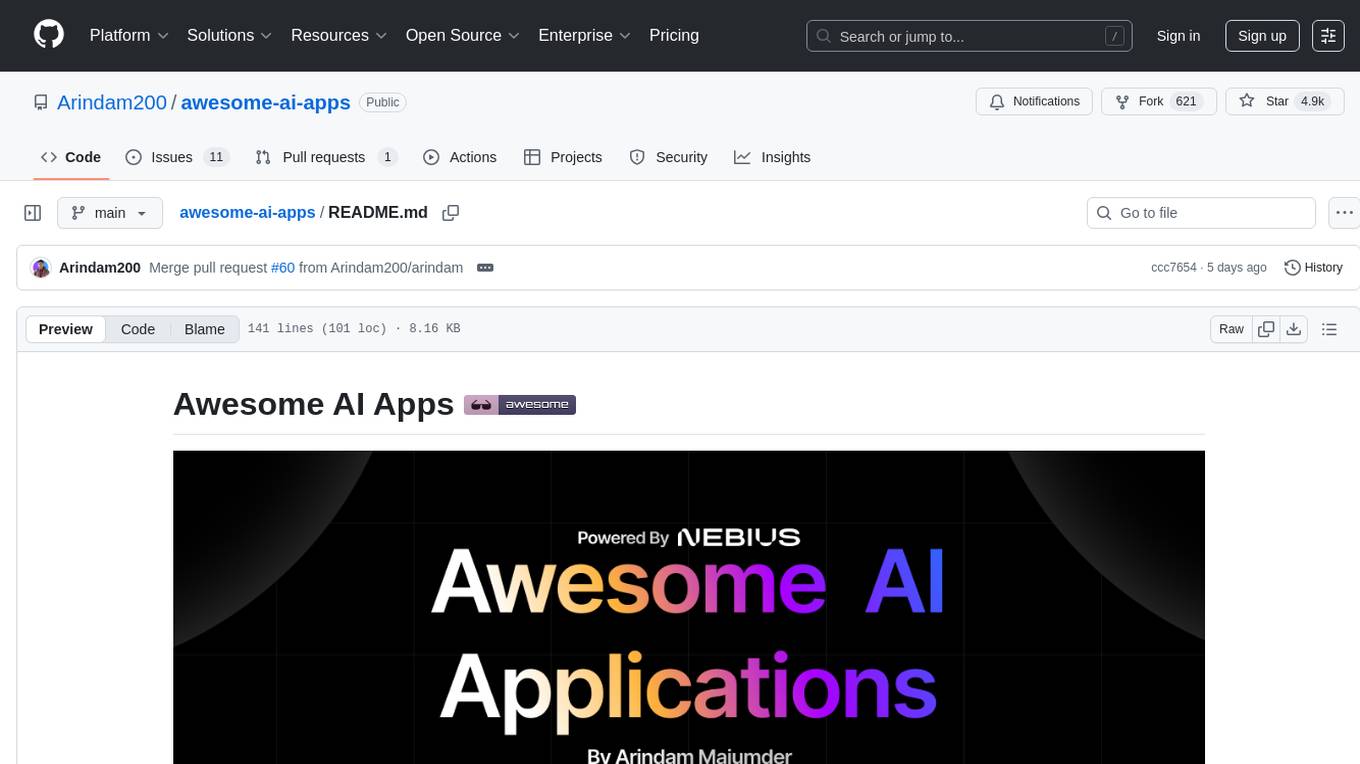
awesome-ai-apps
This repository is a comprehensive collection of practical examples, tutorials, and recipes for building powerful LLM-powered applications. From simple chatbots to advanced AI agents, these projects serve as a guide for developers working with various AI frameworks and tools. Powered by Nebius AI Studio - your one-stop platform for building and deploying AI applications.
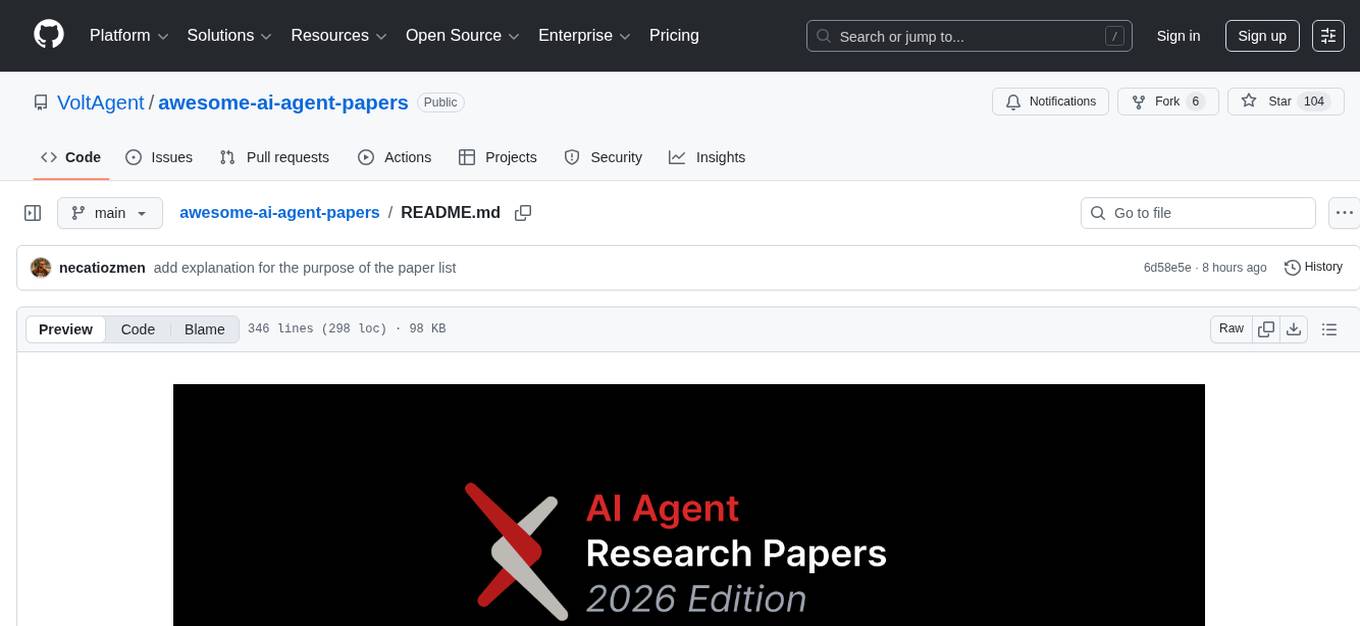
awesome-ai-agent-papers
This repository contains a curated list of papers related to artificial intelligence agents. It includes research papers, articles, and resources covering various aspects of AI agents, such as reinforcement learning, multi-agent systems, natural language processing, and more. Whether you are a researcher, student, or practitioner in the field of AI, this collection of papers can serve as a valuable reference to stay updated with the latest advancements and trends in AI agent technologies.
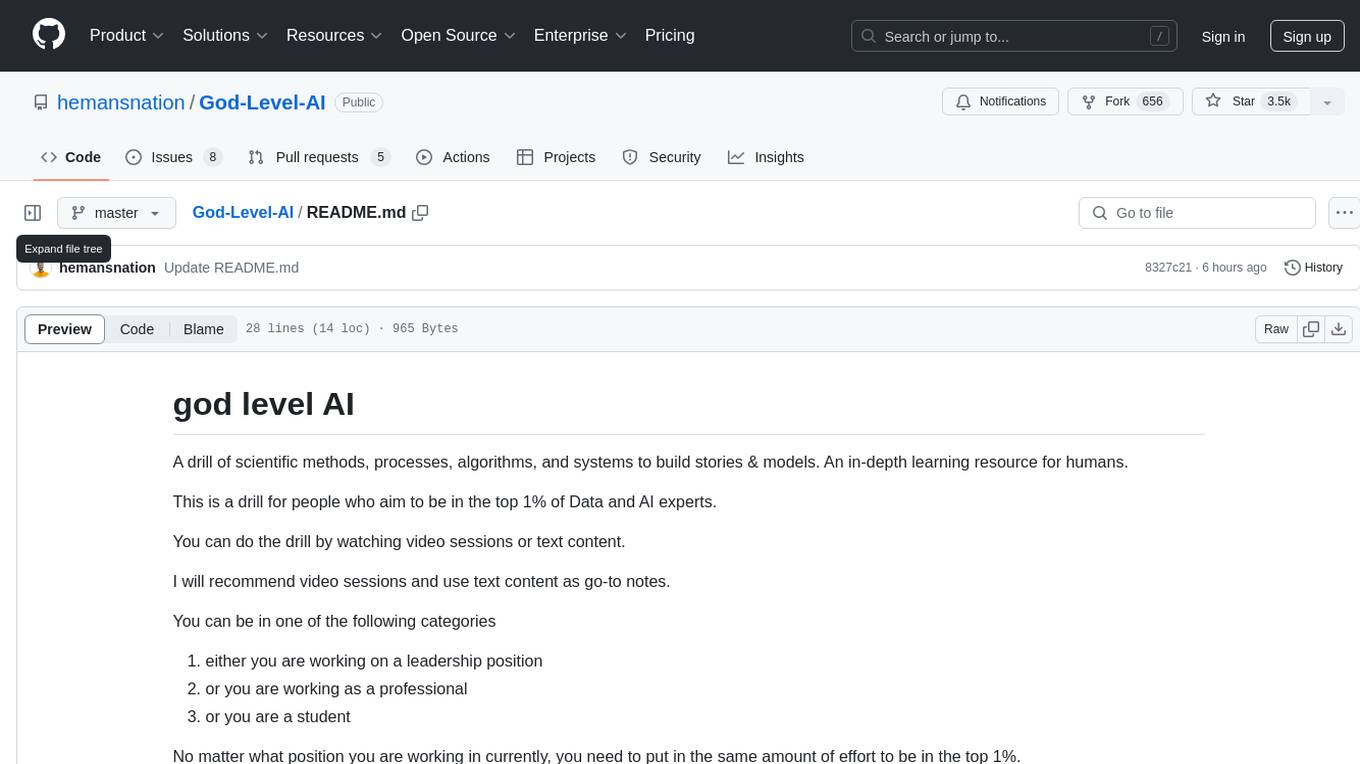
God-Level-AI
A drill of scientific methods, processes, algorithms, and systems to build stories & models. An in-depth learning resource for humans. This repository is designed for individuals aiming to excel in the field of Data and AI, providing video sessions and text content for learning. It caters to those in leadership positions, professionals, and students, emphasizing the need for dedicated effort to achieve excellence in the tech field. The content covers various topics with a focus on practical application.
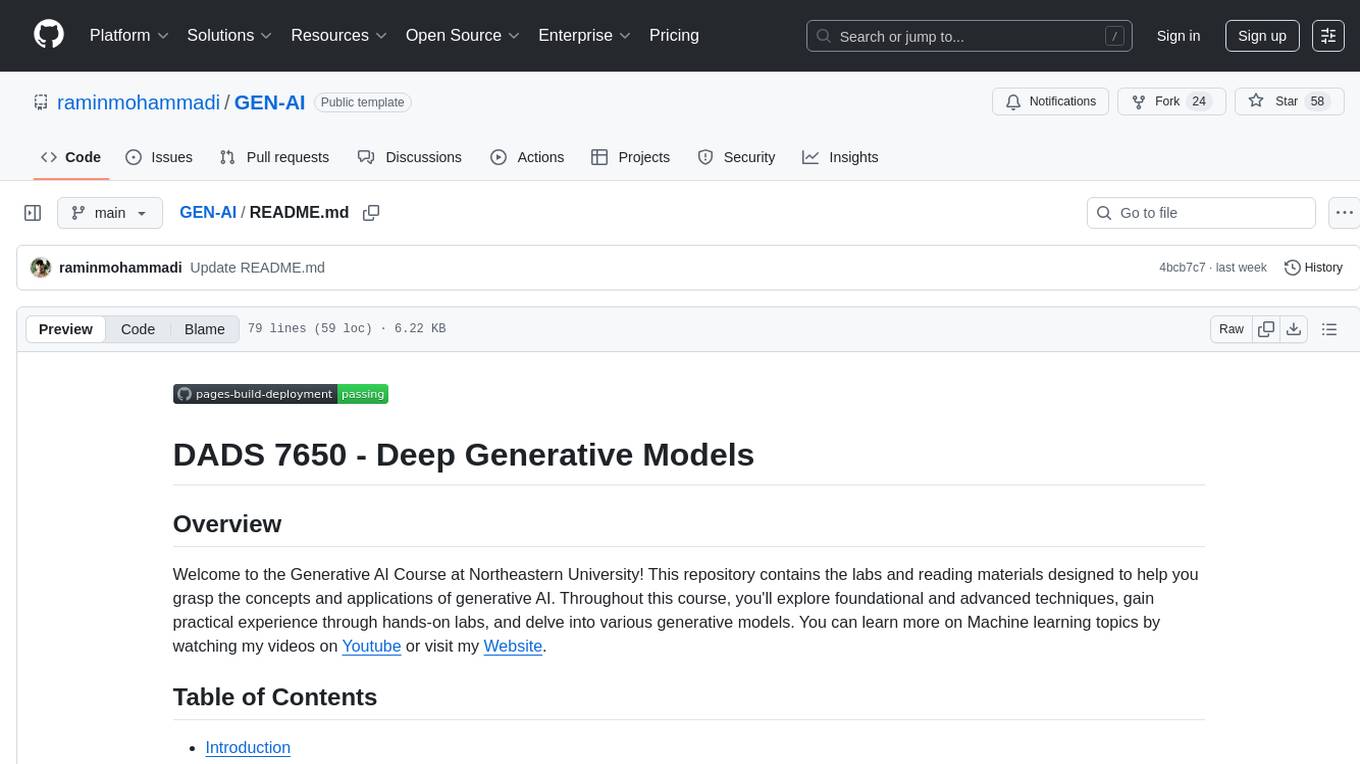
GEN-AI
GEN-AI is a versatile Python library for implementing various artificial intelligence algorithms and models. It provides a wide range of tools and functionalities to support machine learning, deep learning, natural language processing, computer vision, and reinforcement learning tasks. With GEN-AI, users can easily build, train, and deploy AI models for diverse applications such as image recognition, text classification, sentiment analysis, object detection, and game playing. The library is designed to be user-friendly, efficient, and scalable, making it suitable for both beginners and experienced AI practitioners.

open-ai
Open AI is a powerful tool for artificial intelligence research and development. It provides a wide range of machine learning models and algorithms, making it easier for developers to create innovative AI applications. With Open AI, users can explore cutting-edge technologies such as natural language processing, computer vision, and reinforcement learning. The platform offers a user-friendly interface and comprehensive documentation to support users in building and deploying AI solutions. Whether you are a beginner or an experienced AI practitioner, Open AI offers the tools and resources you need to accelerate your AI projects and stay ahead in the rapidly evolving field of artificial intelligence.
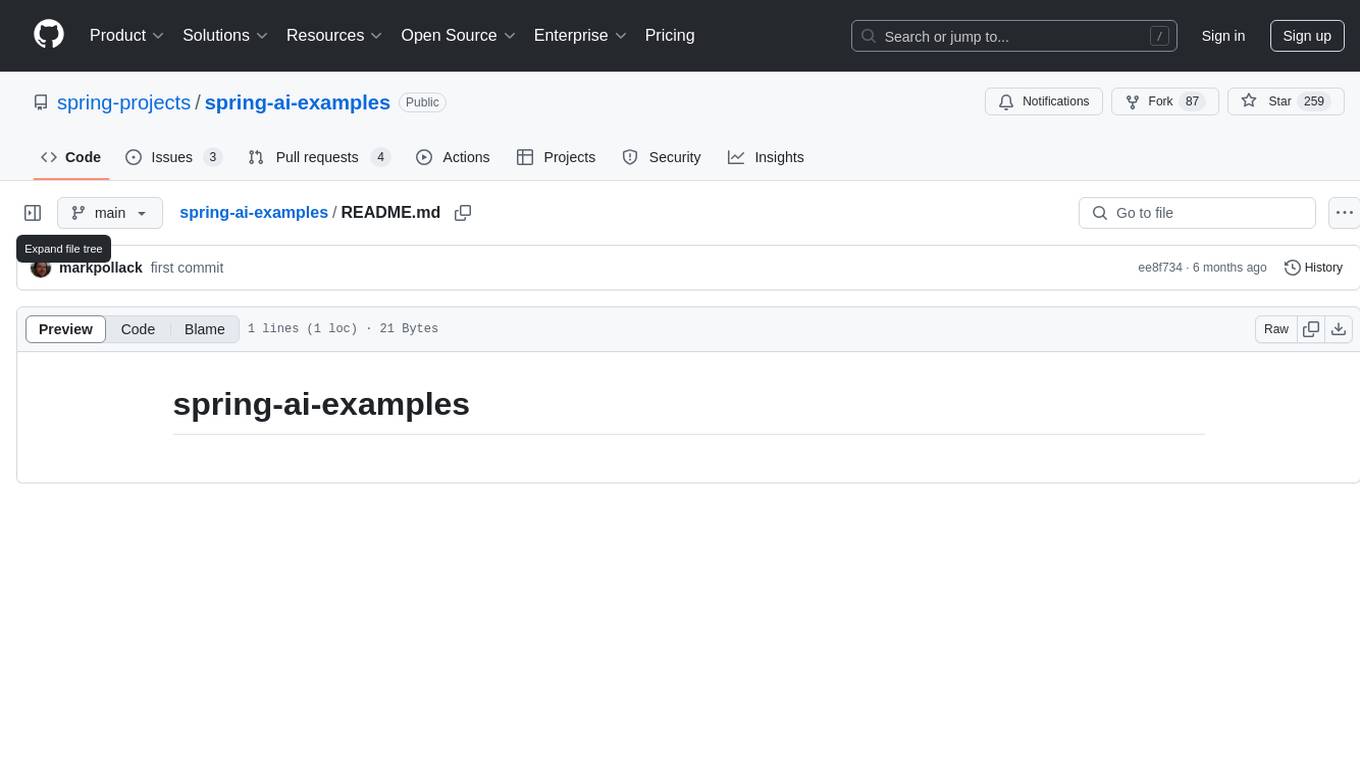
spring-ai-examples
Spring AI Examples is a repository containing various examples of integrating artificial intelligence capabilities into Spring applications. The examples cover a wide range of AI technologies such as machine learning, natural language processing, computer vision, and more. These examples serve as a practical guide for developers looking to incorporate AI functionalities into their Spring projects.
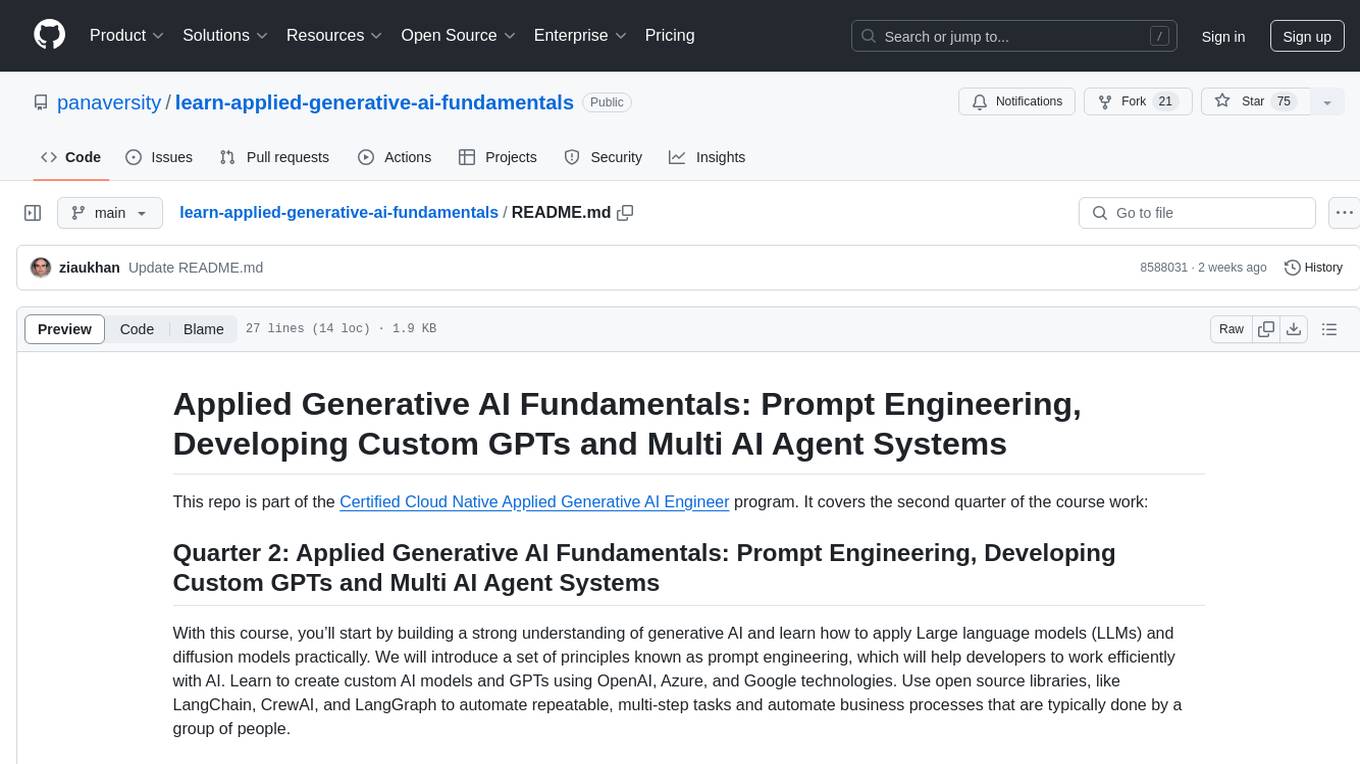
learn-applied-generative-ai-fundamentals
This repository is part of the Certified Cloud Native Applied Generative AI Engineer program, focusing on Applied Generative AI Fundamentals. It covers prompt engineering, developing custom GPTs, and Multi AI Agent Systems. The course helps in building a strong understanding of generative AI, applying Large Language Models (LLMs) and diffusion models practically. It introduces principles of prompt engineering to work efficiently with AI, creating custom AI models and GPTs using OpenAI, Azure, and Google technologies. It also utilizes open source libraries like LangChain, CrewAI, and LangGraph to automate tasks and business processes.
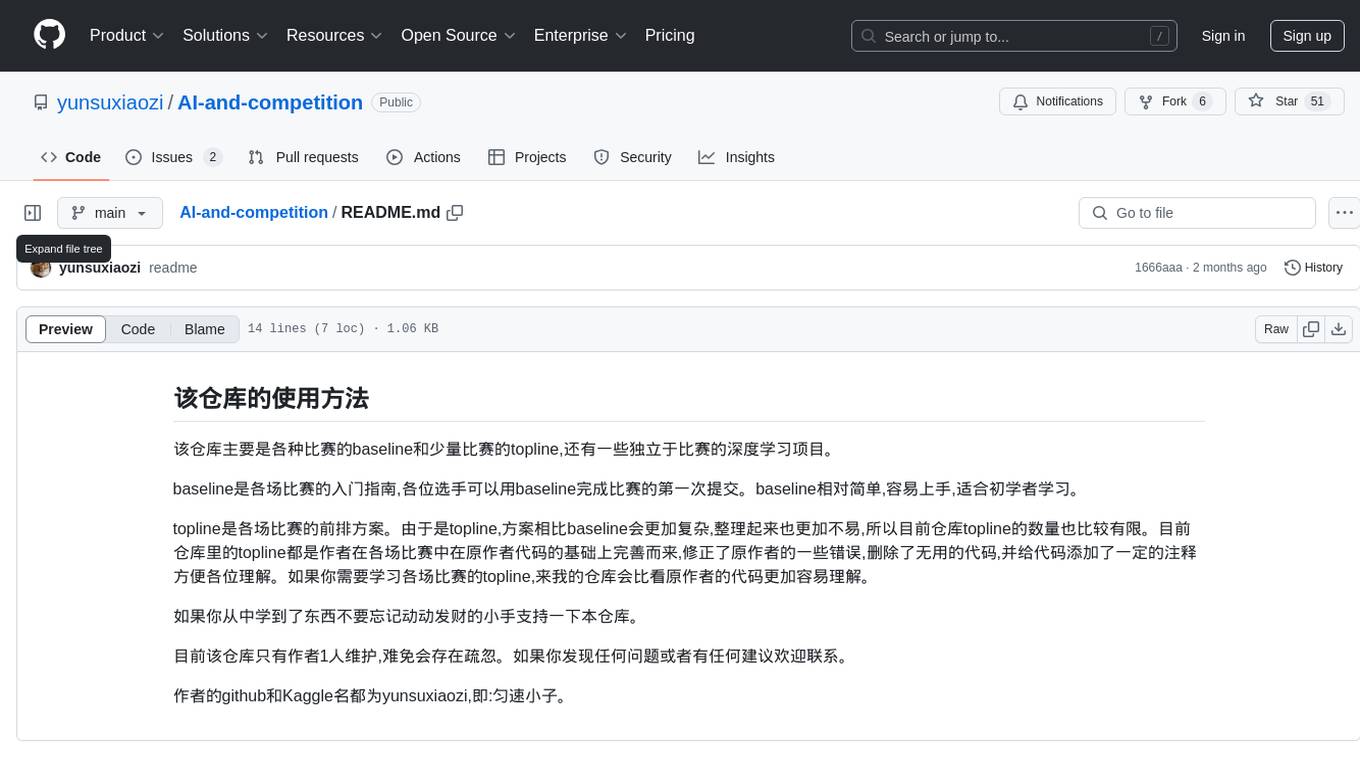
AI-and-competition
This repository provides baselines for various competitions, a few top solutions for some competitions, and independent deep learning projects. Baselines serve as entry guides for competitions, suitable for beginners to make their first submission. Top solutions are more complex and refined versions of baselines, with limited quantity but enhanced quality. The repository is maintained by a single author, yunsuxiaozi, offering code improvements and annotations for better understanding. Users can support the repository by learning from it and providing feedback.
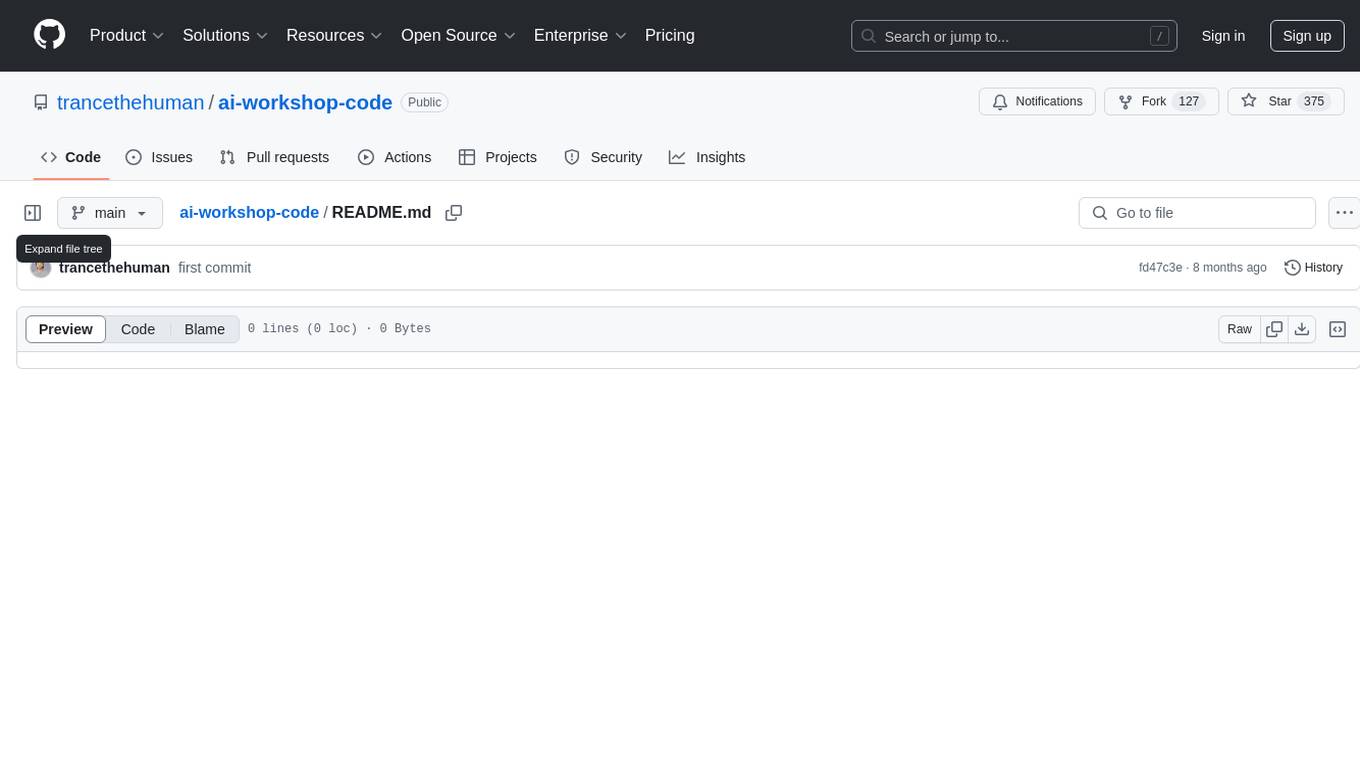
ai-workshop-code
The ai-workshop-code repository contains code examples and tutorials for various artificial intelligence concepts and algorithms. It serves as a practical resource for individuals looking to learn and implement AI techniques in their projects. The repository covers a wide range of topics, including machine learning, deep learning, natural language processing, computer vision, and reinforcement learning. By exploring the code and following the tutorials, users can gain hands-on experience with AI technologies and enhance their understanding of how these algorithms work in practice.
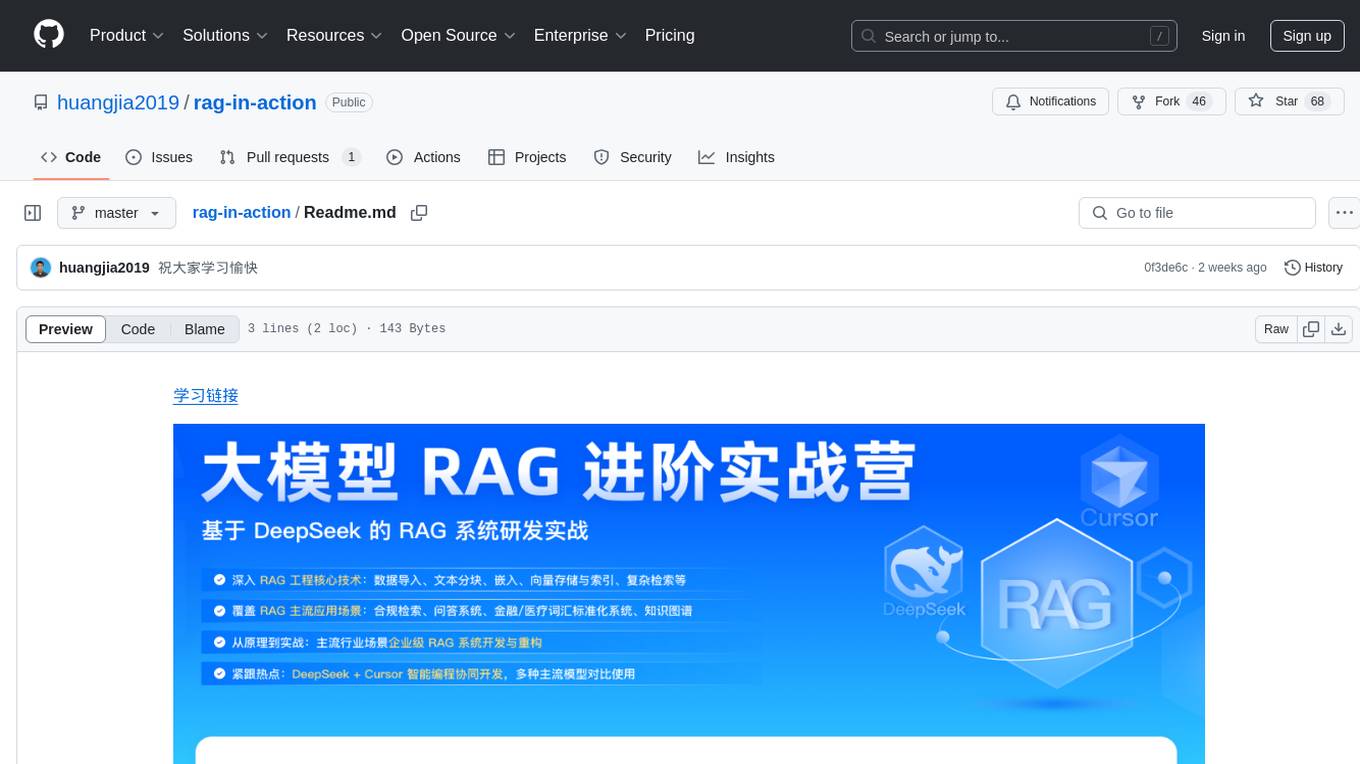
rag-in-action
rag-in-action is a GitHub repository that provides a practical course structure for developing a RAG system based on DeepSeek. The repository likely contains resources, code samples, and tutorials to guide users through the process of building and implementing a RAG system using DeepSeek technology. Users interested in learning about RAG systems and their development may find this repository helpful in gaining hands-on experience and practical knowledge in this area.
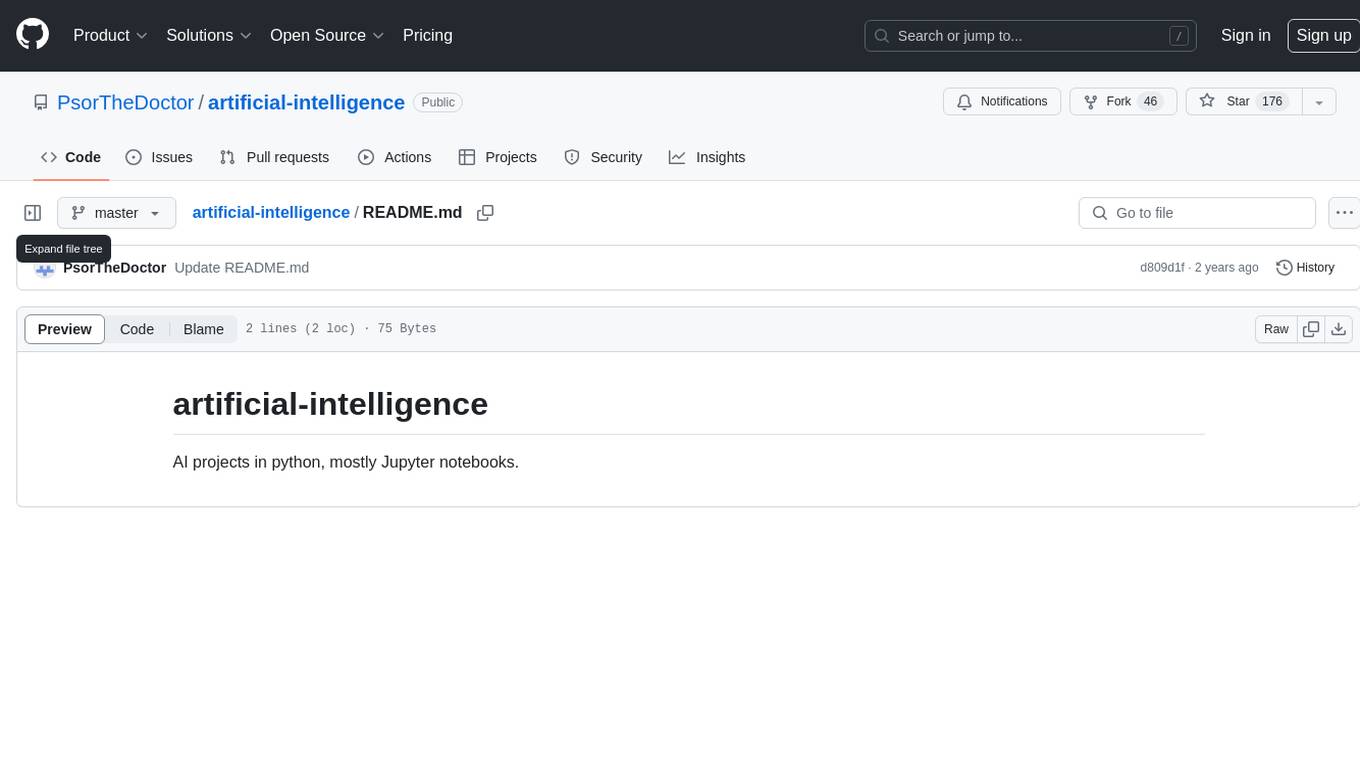
artificial-intelligence
This repository contains a collection of AI projects implemented in Python, primarily in Jupyter notebooks. The projects cover various aspects of artificial intelligence, including machine learning, deep learning, natural language processing, computer vision, and more. Each project is designed to showcase different AI techniques and algorithms, providing a hands-on learning experience for users interested in exploring the field of artificial intelligence.
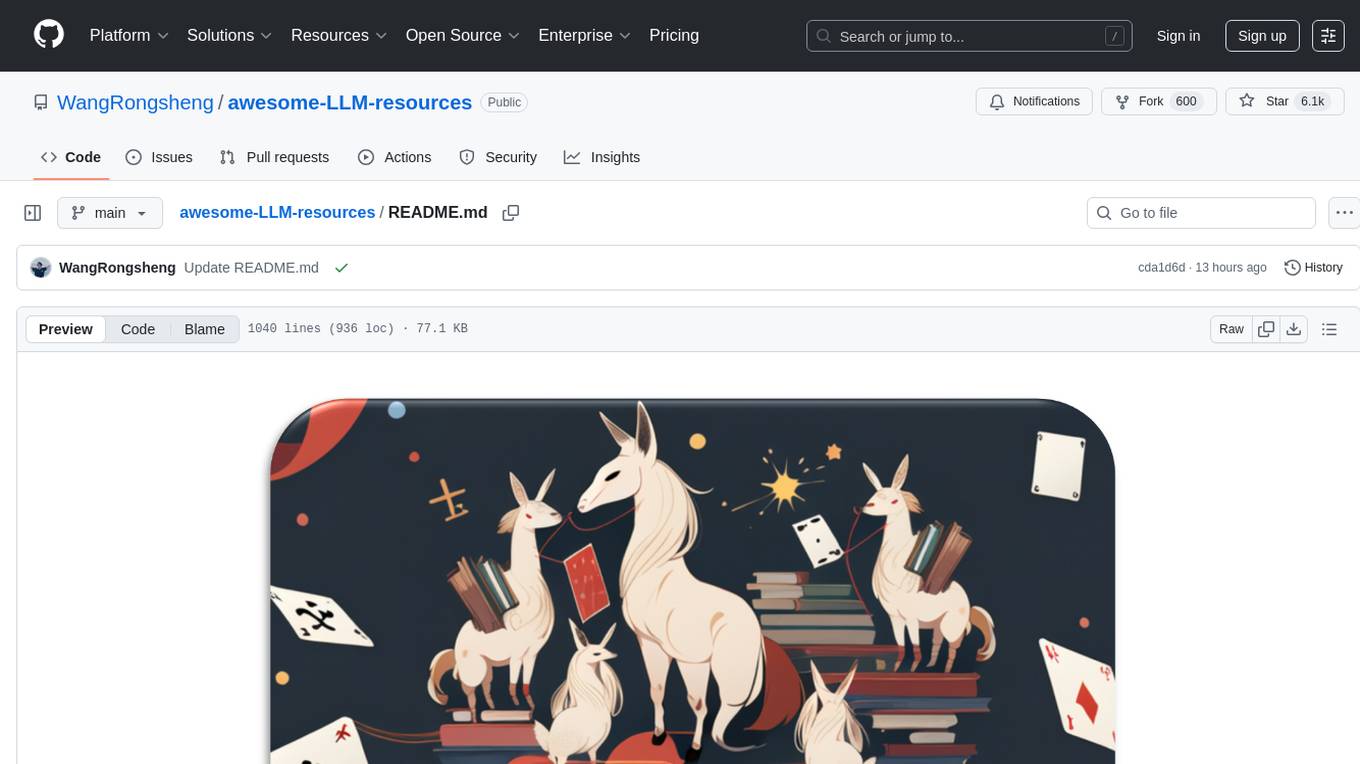
awesome-LLM-resources
This repository is a curated list of resources for learning and working with Large Language Models (LLMs). It includes a collection of articles, tutorials, tools, datasets, and research papers related to LLMs such as GPT-3, BERT, and Transformer models. Whether you are a researcher, developer, or enthusiast interested in natural language processing and artificial intelligence, this repository provides valuable resources to help you understand, implement, and experiment with LLMs.
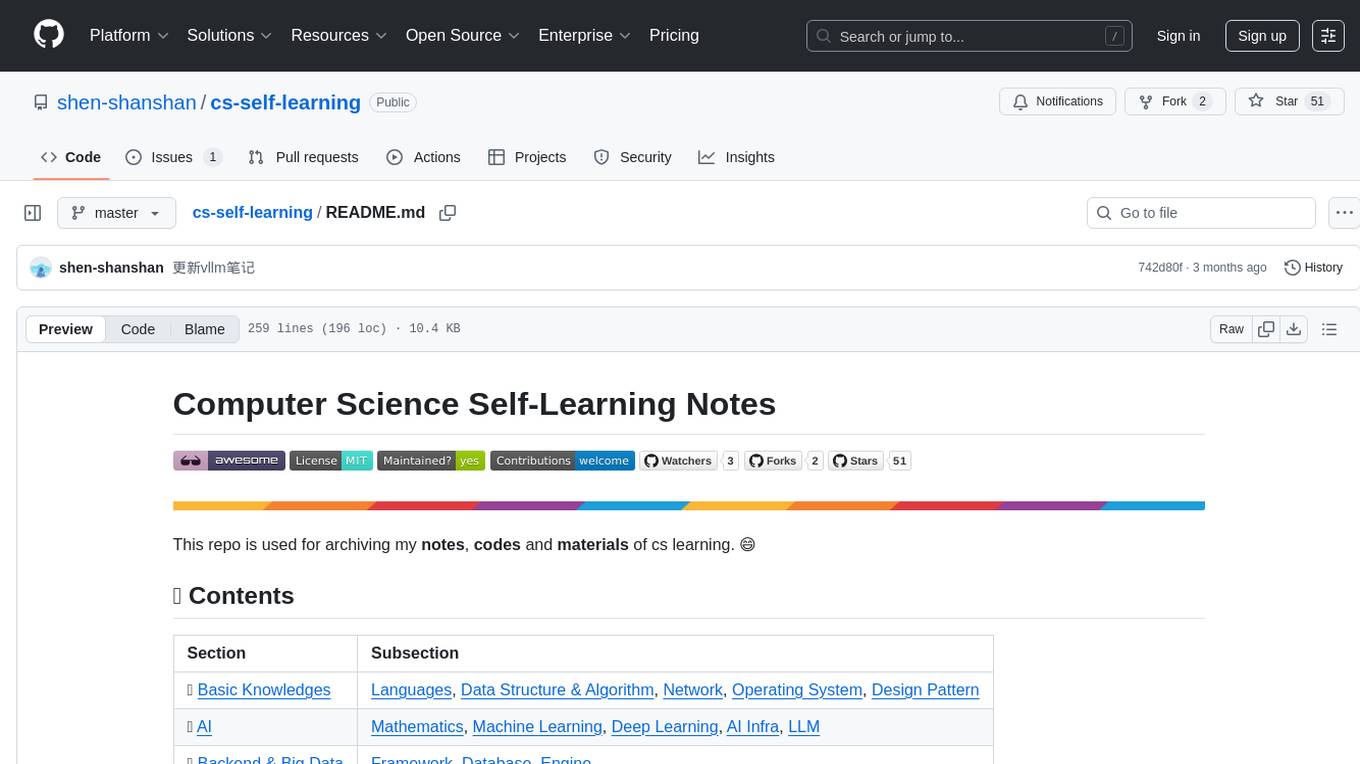
cs-self-learning
This repository serves as an archive for computer science learning notes, codes, and materials. It covers a wide range of topics including basic knowledge, AI, backend & big data, tools, and other related areas. The content is organized into sections and subsections for easy navigation and reference. Users can find learning resources, programming practices, and tutorials on various subjects such as languages, data structures & algorithms, AI, frameworks, databases, development tools, and more. The repository aims to support self-learning and skill development in the field of computer science.
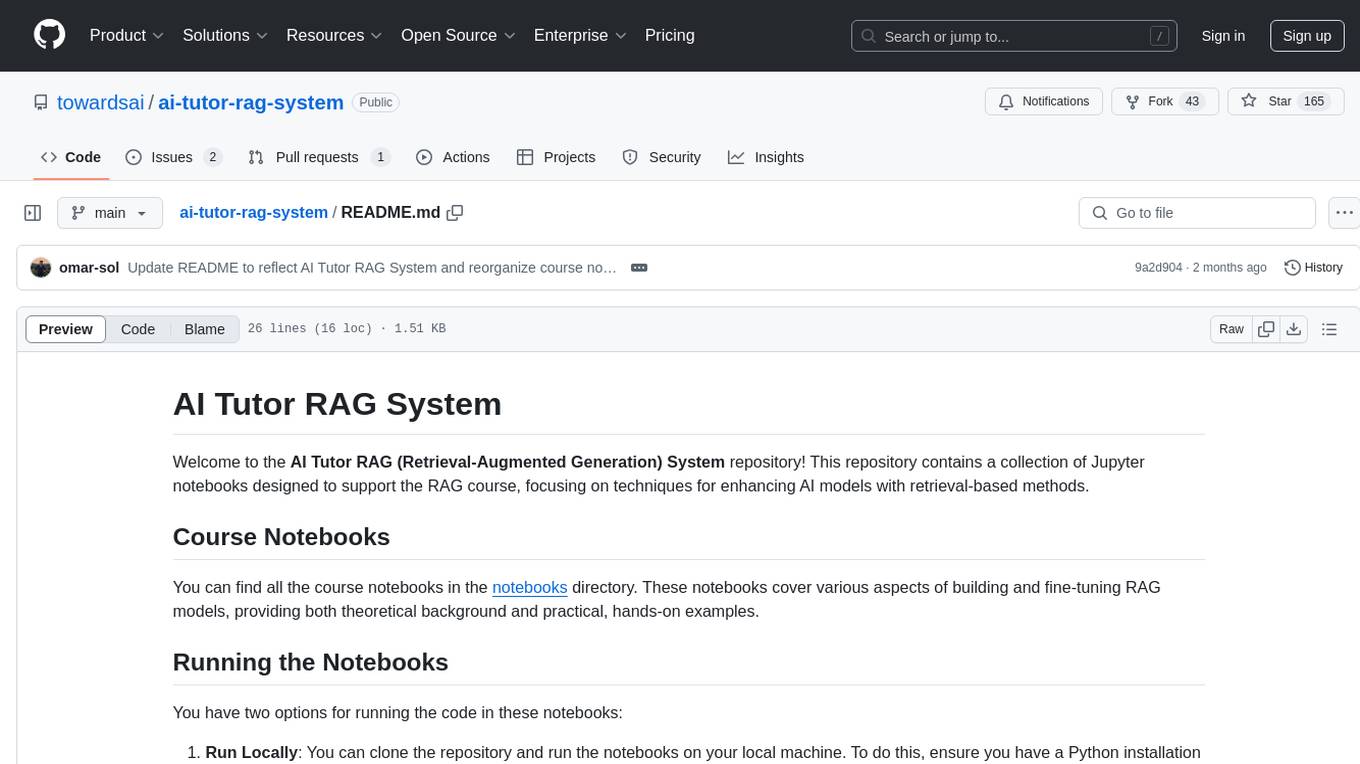
ai-tutor-rag-system
The AI Tutor RAG System repository contains Jupyter notebooks supporting the RAG course, focusing on enhancing AI models with retrieval-based methods. It covers foundational and advanced concepts in retrieval-augmented generation, including data retrieval techniques, model integration with retrieval systems, and practical applications of RAG in real-world scenarios.
For similar tasks

ai-engineering-hub
The AI Engineering Hub is a repository that provides in-depth tutorials on LLMs and RAGs, real-world AI agent applications, and examples to implement, adapt, and scale in projects. It caters to beginners, practitioners, and researchers, offering resources for all skill levels to experiment and succeed in AI engineering.
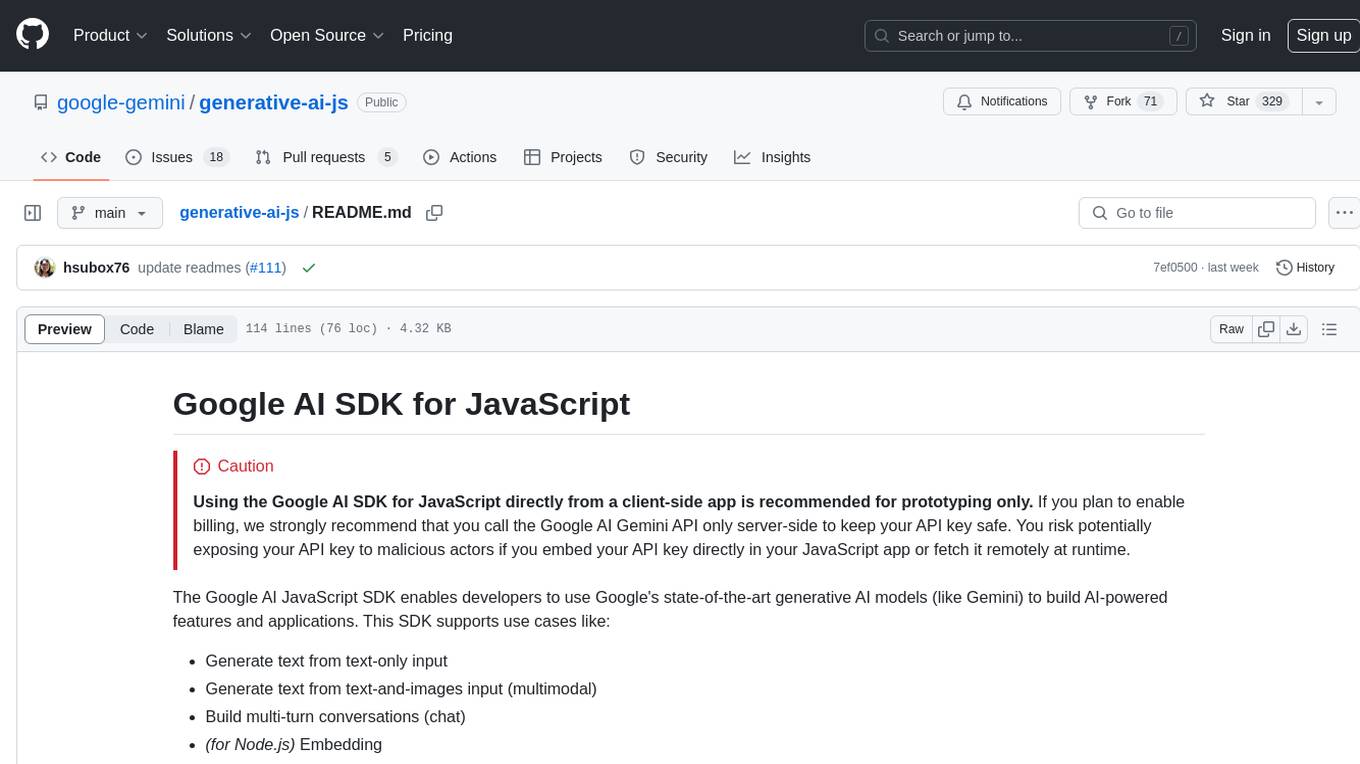
generative-ai-js
Generative AI JS is a JavaScript library that provides tools for creating generative art and music using artificial intelligence techniques. It allows users to generate unique and creative content by leveraging machine learning models. The library includes functions for generating images, music, and text based on user input and preferences. With Generative AI JS, users can explore the intersection of art and technology, experiment with different creative processes, and create dynamic and interactive content for various applications.
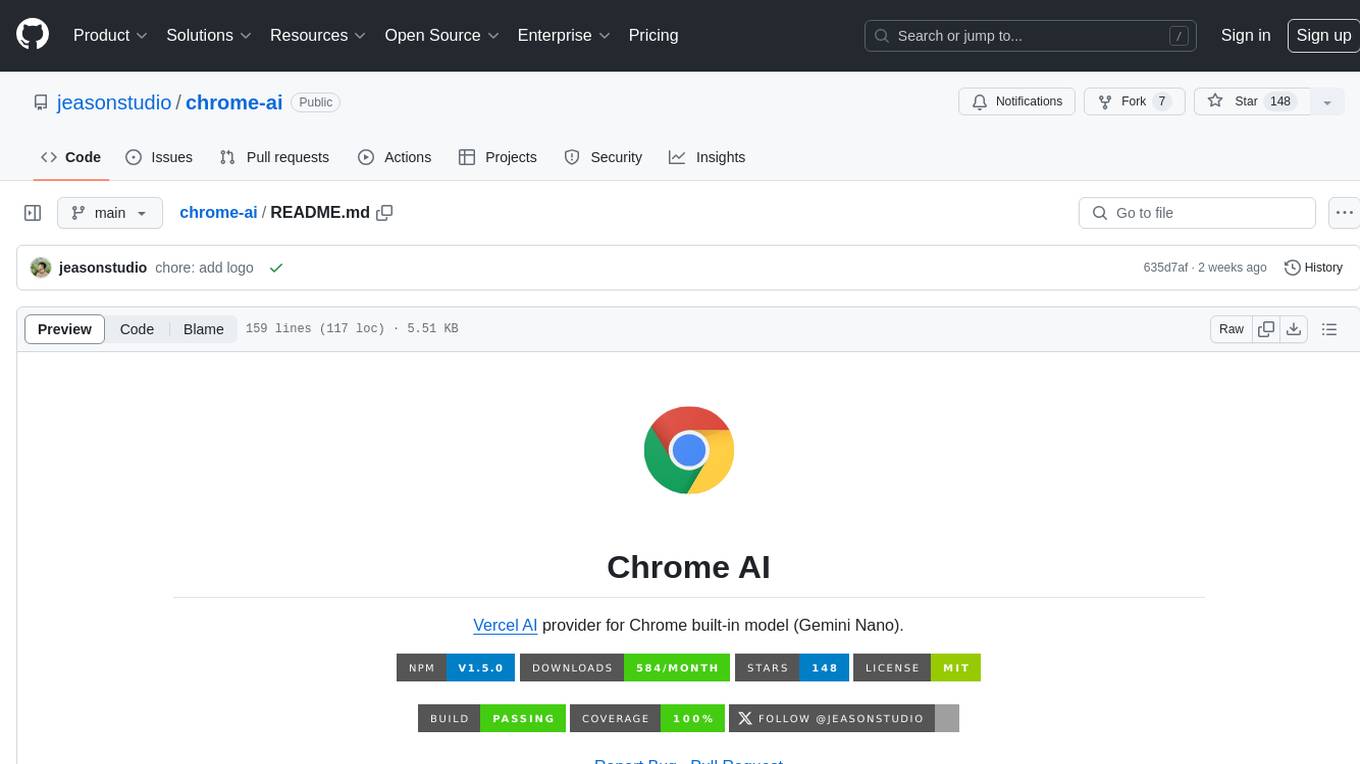
chrome-ai
Chrome AI is a Vercel AI provider for Chrome's built-in model (Gemini Nano). It allows users to create language models using Chrome's AI capabilities. The tool is under development and may contain errors and frequent changes. Users can install the ChromeAI provider module and use it to generate text, stream text, and generate objects. To enable AI in Chrome, users need to have Chrome version 127 or greater and turn on specific flags. The tool is designed for developers and researchers interested in experimenting with Chrome's built-in AI features.
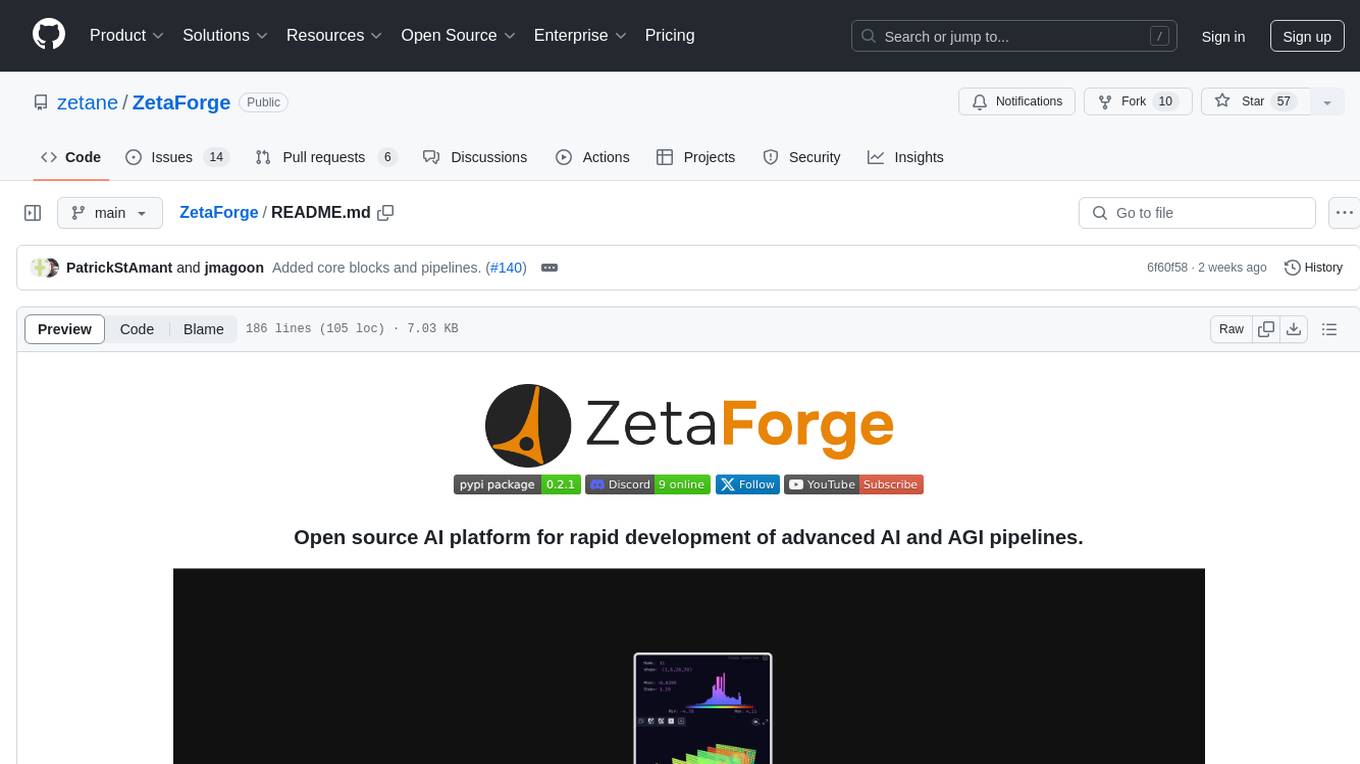
ZetaForge
ZetaForge is an open-source AI platform designed for rapid development of advanced AI and AGI pipelines. It allows users to assemble reusable, customizable, and containerized Blocks into highly visual AI Pipelines, enabling rapid experimentation and collaboration. With ZetaForge, users can work with AI technologies in any programming language, easily modify and update AI pipelines, dive into the code whenever needed, utilize community-driven blocks and pipelines, and share their own creations. The platform aims to accelerate the development and deployment of advanced AI solutions through its user-friendly interface and community support.
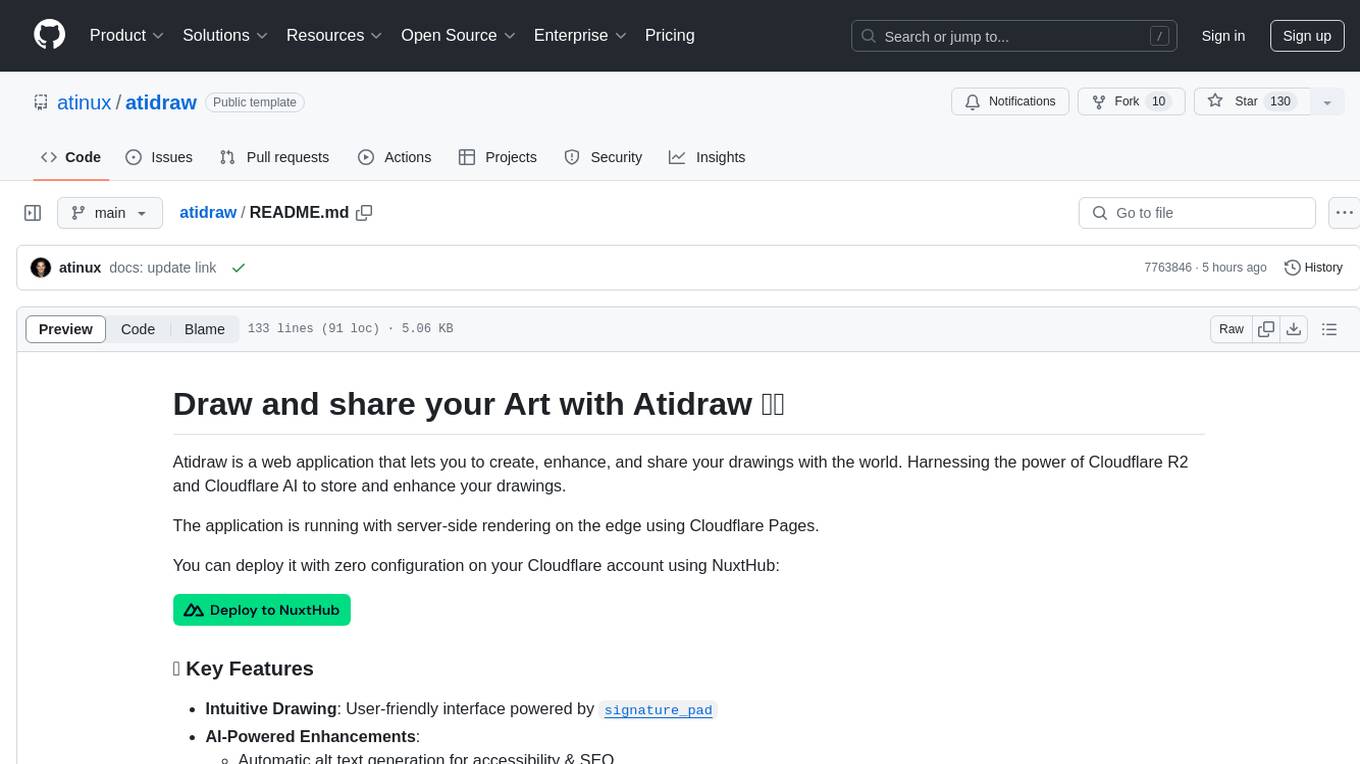
atidraw
Atidraw is a web application that allows users to create, enhance, and share drawings using Cloudflare R2 and Cloudflare AI. It features intuitive drawing with signature_pad, AI-powered enhancements such as alt text generation and image generation with Stable Diffusion, global storage on Cloudflare R2, flexible authentication options, and high-performance server-side rendering on Cloudflare Pages. Users can deploy Atidraw with zero configuration on their Cloudflare account using NuxtHub.
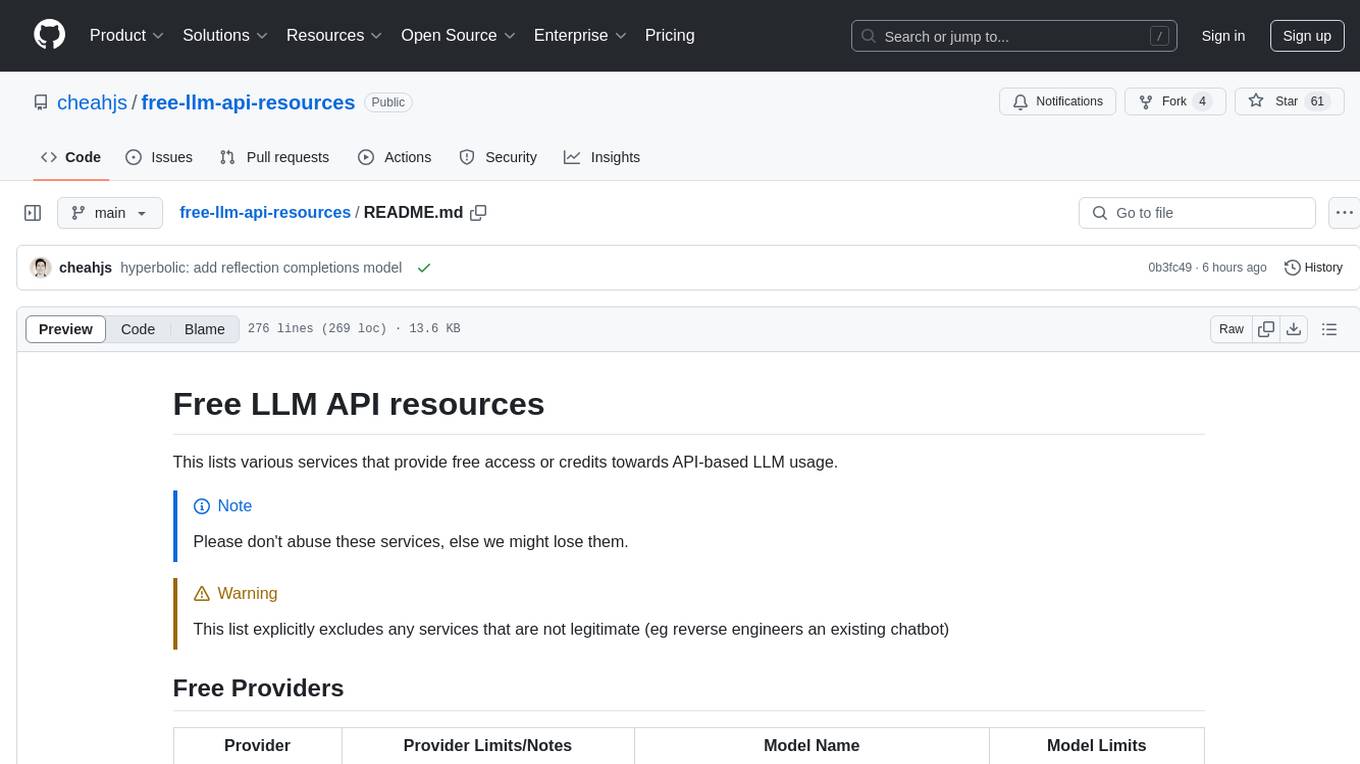
free-llm-api-resources
The 'Free LLM API resources' repository provides a comprehensive list of services offering free access or credits for API-based LLM usage. It includes various providers with details on model names, limits, and notes. Users can find information on legitimate services and their respective usage restrictions to leverage LLM capabilities without incurring costs. The repository aims to assist developers and researchers in accessing AI models for experimentation, development, and learning purposes.
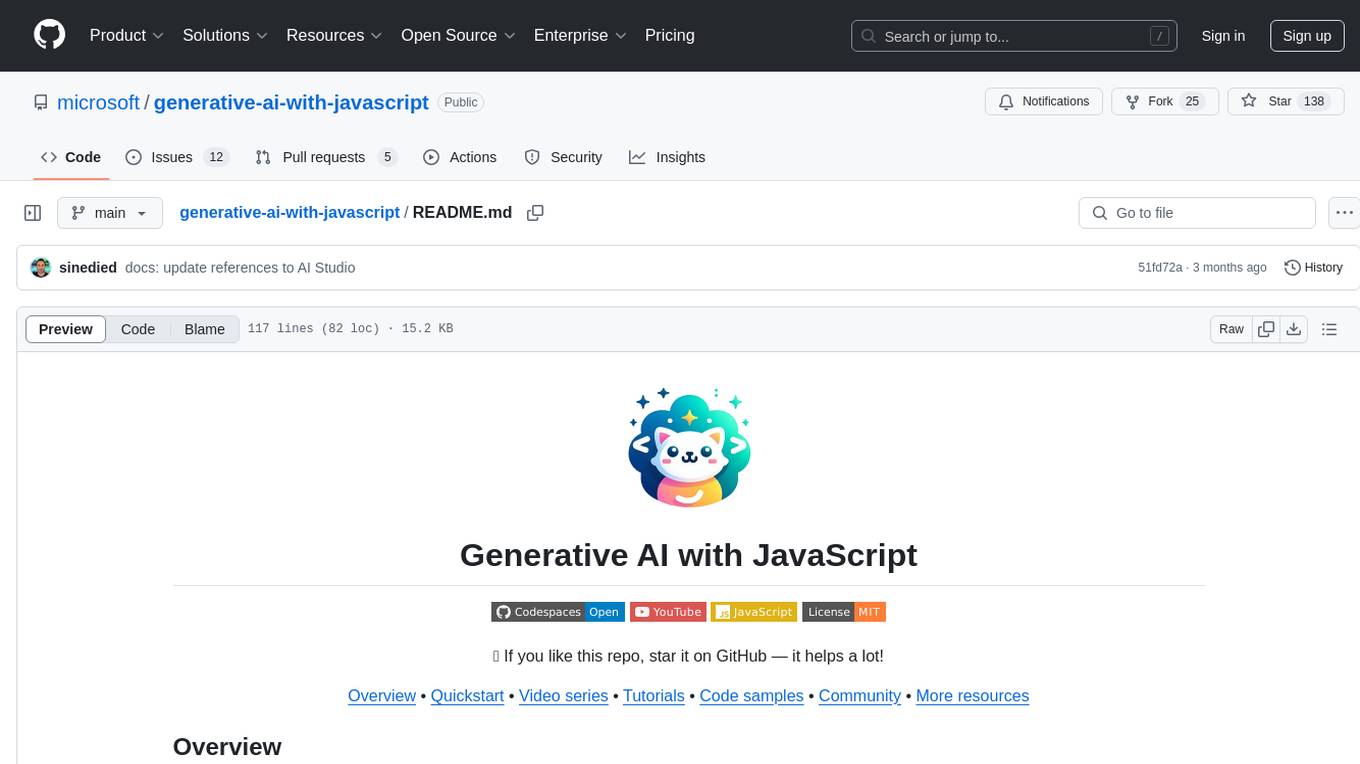
generative-ai-with-javascript
The 'Generative AI with JavaScript' repository is a comprehensive resource hub for JavaScript developers interested in delving into the world of Generative AI. It provides code samples, tutorials, and resources from a video series, offering best practices and tips to enhance AI skills. The repository covers the basics of generative AI, guides on building AI applications using JavaScript, from local development to deployment on Azure, and scaling AI models. It is a living repository with continuous updates, making it a valuable resource for both beginners and experienced developers looking to explore AI with JavaScript.
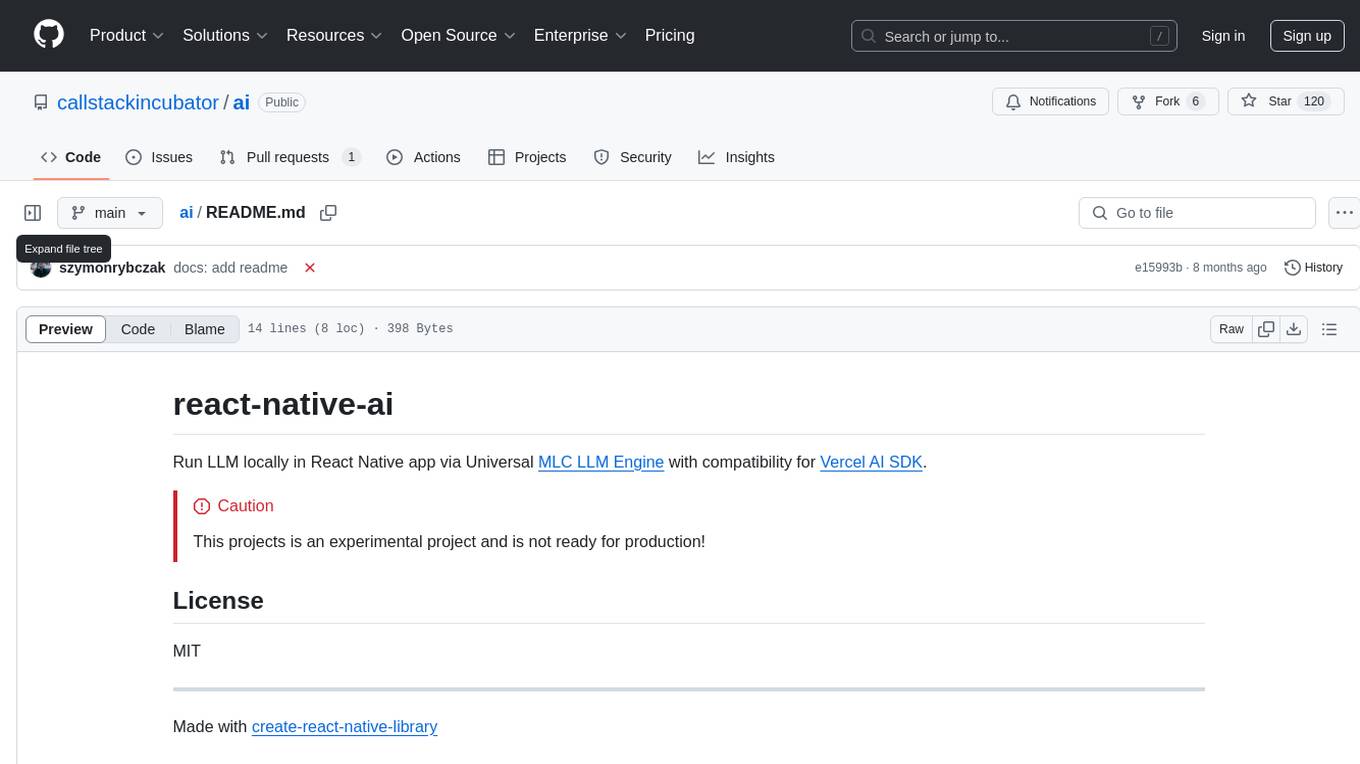
ai
The react-native-ai repository allows users to run Large Language Models (LLM) locally in a React Native app using the Universal MLC LLM Engine with compatibility for Vercel AI SDK. Please note that this project is experimental and not ready for production. The repository is licensed under MIT and was created with create-react-native-library.
For similar jobs

sweep
Sweep is an AI junior developer that turns bugs and feature requests into code changes. It automatically handles developer experience improvements like adding type hints and improving test coverage.

teams-ai
The Teams AI Library is a software development kit (SDK) that helps developers create bots that can interact with Teams and Microsoft 365 applications. It is built on top of the Bot Framework SDK and simplifies the process of developing bots that interact with Teams' artificial intelligence capabilities. The SDK is available for JavaScript/TypeScript, .NET, and Python.

ai-guide
This guide is dedicated to Large Language Models (LLMs) that you can run on your home computer. It assumes your PC is a lower-end, non-gaming setup.

classifai
Supercharge WordPress Content Workflows and Engagement with Artificial Intelligence. Tap into leading cloud-based services like OpenAI, Microsoft Azure AI, Google Gemini and IBM Watson to augment your WordPress-powered websites. Publish content faster while improving SEO performance and increasing audience engagement. ClassifAI integrates Artificial Intelligence and Machine Learning technologies to lighten your workload and eliminate tedious tasks, giving you more time to create original content that matters.

chatbot-ui
Chatbot UI is an open-source AI chat app that allows users to create and deploy their own AI chatbots. It is easy to use and can be customized to fit any need. Chatbot UI is perfect for businesses, developers, and anyone who wants to create a chatbot.

BricksLLM
BricksLLM is a cloud native AI gateway written in Go. Currently, it provides native support for OpenAI, Anthropic, Azure OpenAI and vLLM. BricksLLM aims to provide enterprise level infrastructure that can power any LLM production use cases. Here are some use cases for BricksLLM: * Set LLM usage limits for users on different pricing tiers * Track LLM usage on a per user and per organization basis * Block or redact requests containing PIIs * Improve LLM reliability with failovers, retries and caching * Distribute API keys with rate limits and cost limits for internal development/production use cases * Distribute API keys with rate limits and cost limits for students

uAgents
uAgents is a Python library developed by Fetch.ai that allows for the creation of autonomous AI agents. These agents can perform various tasks on a schedule or take action on various events. uAgents are easy to create and manage, and they are connected to a fast-growing network of other uAgents. They are also secure, with cryptographically secured messages and wallets.

griptape
Griptape is a modular Python framework for building AI-powered applications that securely connect to your enterprise data and APIs. It offers developers the ability to maintain control and flexibility at every step. Griptape's core components include Structures (Agents, Pipelines, and Workflows), Tasks, Tools, Memory (Conversation Memory, Task Memory, and Meta Memory), Drivers (Prompt and Embedding Drivers, Vector Store Drivers, Image Generation Drivers, Image Query Drivers, SQL Drivers, Web Scraper Drivers, and Conversation Memory Drivers), Engines (Query Engines, Extraction Engines, Summary Engines, Image Generation Engines, and Image Query Engines), and additional components (Rulesets, Loaders, Artifacts, Chunkers, and Tokenizers). Griptape enables developers to create AI-powered applications with ease and efficiency.


